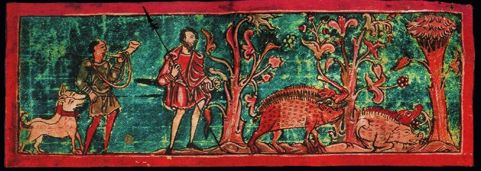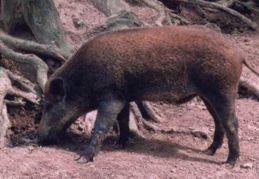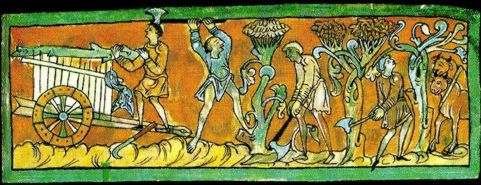 |
Although the forest is an important part of life for many people, only a few of the villagers, Edward ðe Drefend (Hunter) and especially the Thegn, hunt here for food and sport. Midden finds from around towns and villages in northern Europe illustrate this point. The bones of wild animals make up a tiny percentage of the total volume of bones from both hunted and farmed animals. The only places where hunting wasn't the preserve of the wealthy were areas such as far more the smaller scattered settlements or the islands off Scotland. Here for example, Seagull eggs, Seagulls themselves, Puffins etc; still made up a greater part of the diet along with many types of fish that they 'hunted'. Blunt cone shaped arrow heads made of bone have been found at other sites that were intended to stun or kill small game or birds. However, both fishing and hunting are seasonal and unreliable, forcing people to farm to try and guarantee food on the table. Meanwhile back in Wichamstow, only those with time on their hands could afford to hunt. Notice the man in the manuscript image above. He carries a sword along with his spear. He's a man of status, not a Ceorl or simple villager and even has a man accompanying his hunting dogs who will blow a horn for him to startle the boars. This is not a two man game either, especially as he is on foot. There will be a team of other such hands who will ensure that the pigs head in the correct direction for the Thegn and his invited guests, or the day will be a complete fiasco.
When all is back to its normal routine, Lytelmann ðe Swinhyrde keeps watch over the villager's pigs here. Wild nuts, fruits, berries and mushrooms gathered here formed an important supplementary part of the diet for many of the villagers. Godric ðe Treowyrhta cuts his timber here for woodworking and building. It is here that Ælfric ðe Colwyrhta produces the charcoal used by Wiglaf ðe Mæstlingsmith, Maccus ðe Glæswyrhta and Ulfbert ðe Isensmith. To the inhabitants of the land around Wichamstow, the forest would have seemed limitless. Not limitless in size, although few would have circumnavigated it to discover it's true scale, but unchanging; despite all of the trees that came down to supply the estate with fuel and raw materials.
 |
The forest is not impenetrable, just dense. Its margins would have had plenty of human visitors over the seasons. Having said that, it was as groups that people worked there, and despite the fact that most people had a straight forward attitude to the forest, they could be persuaded that 'things' lay further in. Even the most level headed of the men could sometimes be caught thinking this. Plenty of well known tales told as children helped to fuel this belief, and it was hard to put these thoughts behind you when you turned your back on the trees in the evening to return home.
The reality was that most animals such as Boar, Bear and Wolves would steer well clear of human activity, especially when it was obvious that there was more than just one human. The clatter that people make carries quite far, and the animals of the woods could pass by quite closely without being seen or heard. The only real exception to this are the male wild pigs. Not only were they relatively noisy, but they were aware of what human sounds constituted danger, such as hunters. Hunting often went hand in hand with certain ritualised sounds, horses, horns etc. Wood chopping was very different. The sounds of men were those of men concentrating on something else, the axes sinking into the timber and the noise of Oxen waiting impatiently to get back to their stalls.
It was not unknown for people to take refuge deep in the woods. These folk were not necessarily outlaws either. Their reasons for dropping out of mainstream society are varied, but certainly the story of Beowulf and his fight with Grendel points to one reason. It's not unlikely that the tale was created out of a deed carried out by a man called Beowulf who was hired to clear some woods or forest of a troublesome character who had been plaguing a village, and taking refuge in the woods. To add yet more layers of credibility to this, Grendel was being sheltered by his mother who in the story becomes a witch. It is not uncommon of mothers to try and protect their children, however much of a problem child they are. The outcome, despite the usual highs and lows of the story is fairly obvious. But the interesting thing is that whilst Erik Blood Axe was in Norway, he was also asked to rid some woods of berserks who had taken up residence there, and without a battle to interest them, had inevitably been drawn to causing problems in the local villages. This begins to put the antics of Beowulf into a more credible light if the two are similar plots.
The most wary of all creatures of the woods are criminals. They had by their actions made themselves 'Outlaw' - outside the law. Their lives were forfeit by anyone, so it was a risky existence. No doubt a number of them were actually innocent, and had run to avoid the possible penalties if it all went horribly wrong. This action had the opposite effect of condemning them for certain in their peers eyes, and ensuring that to survive, they had to resort to theft or robbery guaranteeing them to a life of crime even if they hadn't started out that way. Their families though, might actually believe in them and travel to pre-arranged venues to hand them food and clothes, doing just what Grendel's mother had done. Swinwudu is also home to a wide variety of flora and fauna, and its reported Bandits.
 |